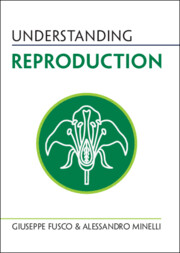Book contents
- Understanding Reproduction
- Series page
- Understanding Reproduction
- Copyright page
- Reviews
- Contents
- Foreword
- Preface
- Acknowledgements
- 1 Individuals and Reproduction
- 2 Reproduction in the Life Cycle
- 3 Reproduction Without Sex
- 4 Reproduction with Sex
- 5 Two-Parent Sexual Reproduction
- 6 One-Parent (or Nearly so) Sexual Reproduction
- 7 Development of Sexual Traits
- 8 Widening the View: Reproductive Strategies
- Concluding Remarks: Difficult Boundaries
- Summary of Common Misunderstandings
- References and Further Reading
- Figure Credits
- Index
3 - Reproduction Without Sex
Published online by Cambridge University Press: 27 July 2023
- Understanding Reproduction
- Series page
- Understanding Reproduction
- Copyright page
- Reviews
- Contents
- Foreword
- Preface
- Acknowledgements
- 1 Individuals and Reproduction
- 2 Reproduction in the Life Cycle
- 3 Reproduction Without Sex
- 4 Reproduction with Sex
- 5 Two-Parent Sexual Reproduction
- 6 One-Parent (or Nearly so) Sexual Reproduction
- 7 Development of Sexual Traits
- 8 Widening the View: Reproductive Strategies
- Concluding Remarks: Difficult Boundaries
- Summary of Common Misunderstandings
- References and Further Reading
- Figure Credits
- Index
Summary
On February 1997 the birth was announced of a sheep named Dolly, the first mammal to be cloned from an adult cell of a mother individual. The event attracted enormous media attention. Dolly, born on 5 July 1996, actually had three ‘mothers’: one provided the egg (whose nucleus was removed), another the nucleus with the DNA picked out from a somatic cell (i.e. a cell of the body not specialized for reproduction), while the third mother carried the cloned embryo in her womb until parturition.
Keywords
- Type
- Chapter
- Information
- Understanding Reproduction , pp. 49 - 63Publisher: Cambridge University PressPrint publication year: 2023

